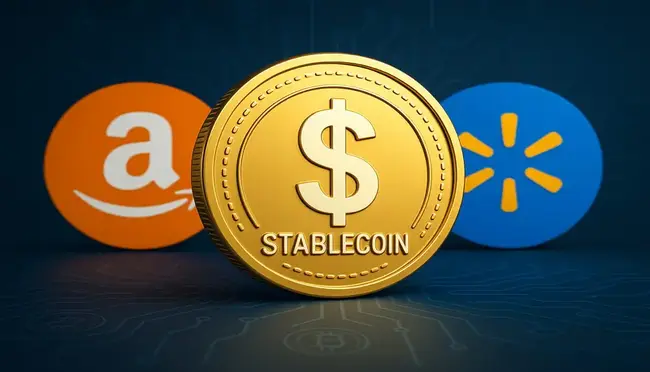Highlights:
- The two multinational companies plan to launch stablecoins to lower costs and hasten payments.
- The GENIUS Act may decide how companies use stablecoin payments across the United States.
- Scott Bessent said the stablecoin sector could grow to $2 trillion by 2028 if lawmakers pass the right policies.
Amazon and Walmart, among the largest companies in e-commerce and retail, are reportedly considering the launch of their own U.S. dollar-backed stablecoins. The move could help both retailers reduce their reliance on traditional financial systems. According to sources familiar with the matter, both companies are in the early stages of discussion. They aim to create payment systems that allow customers to use digital tokens for purchases on their platforms.
Amazon & Walmart looking to increase their margins by cutting out CC processing fees? This could be very interesting for cash back rewards pic.twitter.com/sqeri7Rjq6
— Scott Krauss (@scottkrauss) June 13, 2025
The plans, neither of which have been confirmed by the respective companies, have the potential to redirect significant proportions of payment traffic currently flowing through the established financial intermediaries. Through stablecoins, these companies can also lower the cost of payment processing and accelerate the settlement of transactions.
Businesses regularly pay between 1-3% of each sale to credit card companies such as Visa and Mastercard. These fees add up when it comes to billions of payments, and stablecoins present a method of saving money. In addition, digital payment transactions can be settled in almost real-time, as opposed to one to three business days for regular card transactions. The accelerated settlement can assist retailers in gaining access to cash within a short period of time and in improving supplier relationships.
GENIUS Act Could Pave the Way for Stablecoin Adoption
The GENIUS Act has become a focal bill that might shape the future of stablecoin payments in the United States. The bill is intended to establish national regulations regarding the way businesses issue and handle U.S. dollar-pegged digital currencies. It is also aimed at necessitating complete adherence to the anti-money laundering policies and asset-backing standards. The Senate passed the act by a vote of 68 to 30, and a final vote is anticipated on June 17 in the U.S. Senate. Should it pass, the bill would go to the House of Representatives, where legislators are considering another version.
Supporters say the bill will give companies like Amazon and Walmart the certainty they need to proceed with stablecoin payment systems. Trade groups such as the Merchants Payments Coalition have voiced strong support for the legislation. They argue that the bill could encourage competition with card networks and reduce transaction fees for merchants.
Walmart has also pushed for changes to the bill that would introduce more players into the credit card space. These proposed changes would give retailers more choices and lower costs for handling payments.
Corporate Interest in Stablecoin Payments Continues to Grow
Amazon and Walmart also are not the only businesses looking into stablecoin payments. Shopify, a Canadian multinational e-commerce company, intends to introduce the USDC by the close of 2025. Ripple has already created RLUSD, and other giant banks, such as JPMorgan and Citigroup, are exploring stablecoin solutions.
Shopify will enable USDC (Stablecoins on @Base) in Checkout via Shopify Payments and Shop Pay. Early access starts today, roll out throughout the year.
We think that stablecoins are a natural way to transact on the Internet and worked with coinbase to develop the commerce… pic.twitter.com/o6jme8kSha
— tobi lutke (@tobi) June 12, 2025
Furthermore, Tether has recently stated it would launch a U.S.-based stablecoin focused on institutional customers. The shift is part of a broader trend of companies transitioning to digital assets as a payment method. U.S. Treasury Secretary Scott Bessent said the stablecoin sector could grow to $2 trillion by 2028 if lawmakers pass the right policies. As more companies prepare for this shift, the outcome of the GENIUS Act could determine how quickly stablecoin payments expand.
Best Crypto Exchange
- Over 90 top cryptos to trade
- Regulated by top-tier entities
- User-friendly trading app
- 30+ million users
eToro is a multi-asset investment platform. The value of your investments may go up or down. Your capital is at risk. Don’t invest unless you’re prepared to lose all the money you invest. This is a high-risk investment, and you should not expect to be protected if something goes wrong.






